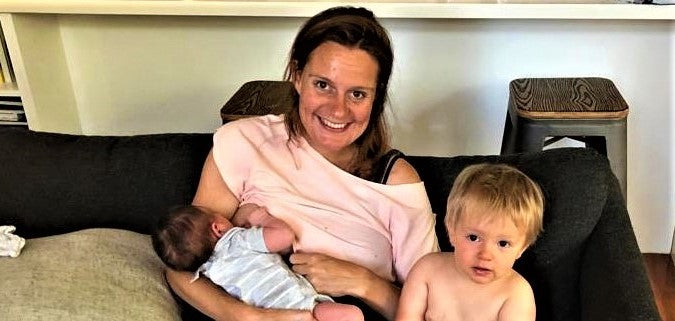There’s a lot of change that happens when we become a new mum. Along with our bodies and our lifestyle, one of the biggest changes we might encounter is our desire for sex during breastfeeding.

Nobody knows breastfeeding better than today’s incredible guest, Registered Midwife and International Board Certified Lactation Consultant, Susie Prout. Along with helping mamas have the best success in their breastfeeding journey, Susie is also the host of The Australian Breastfeeding Podcast (a must-listen for all new mamas).
In this blog, Susie shares the link between breastfeeding and our libido, some of the reasons we might not desire sex while breastfeeding and the incredible power of our hormones.
What we do (and don’t know) about breastfeeding and libido
Talking about our sex life can be an awkward and uncomfortable conversation to have, especially as a new mum. Your body has been through so much and not feeling like yourself sexually can be a hard thing to talk about with your friends, family and other mums.
In some cases, we can internalise guilt, shame and embarrassment around our sex drive during breastfeeding. We might think we’re falling out of love with our partners or not feel ready to share what happened to our body during birth.
The less we talk about our sex life during breastfeeding, the more likely we can be to suffer in silence.
Susie explains that unfortunately there isn’t a lot of research into the link between breastfeeding and libido, which means it's hard to find reliable information about what’s really going on.
This leads to one of the biggest misconceptions about libido and breastfeeding: that we should feel ready to have sex again just a few weeks after birth. Our six week postnatal check is often seen as milestone for when our body is healed and ready for things like gentle exercise and even sex to recommence. But as Susie explains, this isn’t the case for many mamas.
“Everyone talks about this six week mark when you go back to your doctor or midwife to check-in and tick you off as being okay. While six weeks is enough for internal stitches and even a Cesarean scar to heal… it’s not enough for your whole body to have healed,” explains Susie.
While some mums might feel ready and healed at this point, Susie shares it can take upwards of a year to two years to feel completely healed.
All of us will have a totally different experience during pregnancy, birth and healing postpartum. Putting pressure on ourselves to bounce back can make us feel embarrassed and vulnerable, especially in the bedroom. But, there’s no need to put a date or timeline on your recovery.

Why are some new mums not interested in having sex?
Bringing new life into the world is a huge milestone. Whether this is your first bub or you’ve done it all before, everyone’s pregnancy and postpartum recovery will be totally different.
For some of us, a gentle birth might mean we feel ready for sex within a couple of months of birth. But for others, it can be a much longer journey to reconnect with our libido.
Susie reveals that there’s a range of common factors that might decrease our lidio or make us feel less inclined to have sex.
Fatigue and sleep deprivation
You already know that sleep can be hard to come by as a new mum. If you’re only getting a few uninterrupted hours of rest a night, using those few hours to have sex might be the last thing on your mind.
Body changes
It’s incredible what our bodies can do for us, especially during pregnancy. Everyone’s birth story is different and we might feel embarrassed or uncomfortable with how our body has evolved since delivery.
From weight changes to a swollen tummy and even sore breasts, not feeling familiar with our body can impact our desire to have sex, too.
Feeling ‘touched out’
When we’re breastfeeding, we can be feeding every couple of hours (or more - especially in the early days). If our breasts are being used so frequently as a food source for our baby, we can experience a sense of fatigue.
If you’re craving time for yourself and feel like your boobs need a break, it’s completely normal! Your body is working harder than ever, and adding sex into the picture might not be right for you at this point.
Breast aversion
In a similar vein, it can be tricky to see our breasts in a sexual way when we’re breastfeeding. Susie shares that some women don’t want their breasts touched at all by their partner when they’re lactating for a number of reasons.
Our breasts might be sore, feel full of milk or we could be navigating a common breastfeeding challenge (such as blocked ducts, mastitis or engorgement).
If that’s the case for you, it’s no wonder you no longer want your sensitive breasts to be touched in a sexual way.
Not wanting another pregnancy
If we’re not taking contraception in the first few weeks or months postpartum, we might be conscious of not falling pregnant again too quickly. In some cases, we might feel it’s easier to avoid sex altogether rather than worrying about the possibilitiy of another pregnancy so close to our previous one.
Low libido can be our body’s natural contraception
Susie is quick to highlight that there’s a reason much bigger than our own sexual desire at play during breastfeeding. Our hormones not only help our body to produce milk but can also act as a natural contraceptive that has a big role in our libido.
After birth, our bodies produce higher levels of prolactin and oxytocin which work together to support milk production and flow through the breasts.
But, these hormones (particularly prolactin) also suppress ovulation and are our bodies’ natural way of preventing us from falling pregnant again so we can focus on breastfeeding (if that’s right for us).
If we’re not ovulating, our bodies might not feel fertile and this can cause a drop in our desire for sex.
Plus our levels of estrogen (which are usually high during ovulation) are low during pregnancy and in our first postpartum period. Low levels of estrogen mean our body isn’t creating cervical mucus or giving us that natural lubrication that makes sex comfortable and pleasurable.
All of us will begin to feel sexual again at different points in our journey. Some of us will feel like we never lose our libido, while for others it might only return once we stop breastfeeding.
The biggest thing Susie wants mums to remember is this: “There’s nothing wrong with you, and your libido will 100% come back. It’s not lost.”
If in doubt, please always consult your healthcare professional.






